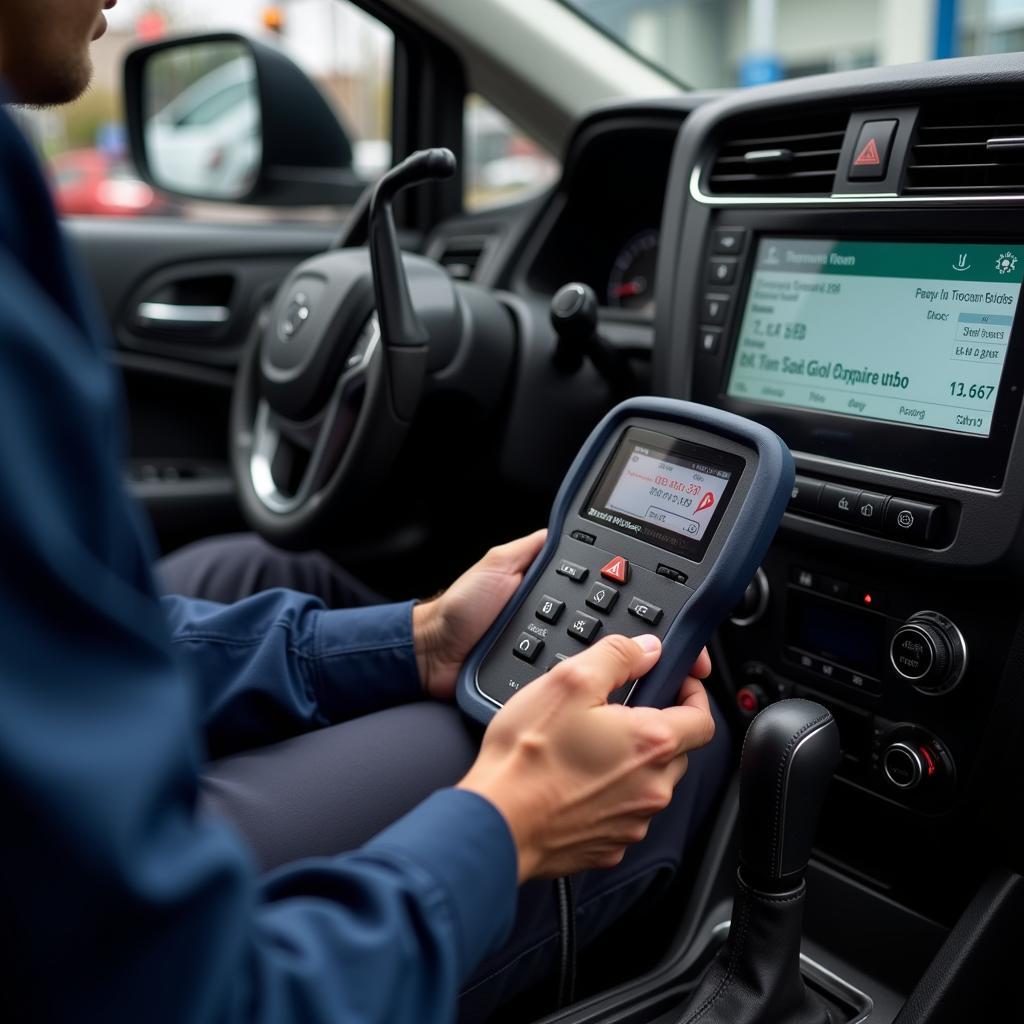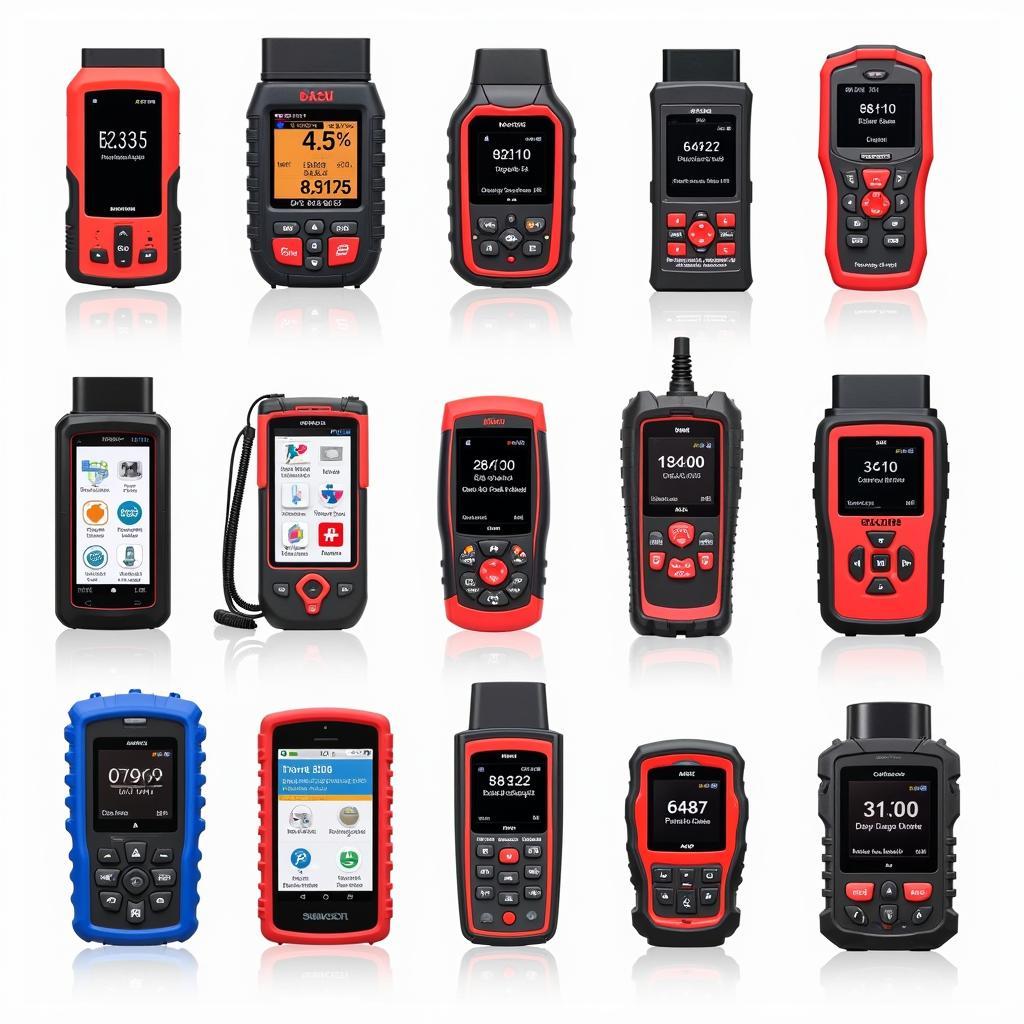The world of automotive repair has evolved significantly, and with it, the tools car mechanics use for diagnosis. No longer are mechanics limited to basic hand tools and gut instincts. Today, sophisticated Car Mechanic Diagnostic Tools are essential for accurately pinpointing issues, saving time, and ensuring efficient repairs. This guide delves into the world of these tools, equipping you with the knowledge to understand their functionalities and importance.
Why are Car Mechanic Diagnostic Tools Crucial?
Modern vehicles are complex machines, with intricate electronic systems controlling everything from engine performance to safety features. When a problem arises, it triggers a cascade of warning lights and error codes that can be challenging to decipher without specialized equipment. This is where car mechanic diagnostic tools shine. They act as a window into the vehicle’s computer system, providing:
-
Accurate Fault Identification: Gone are the days of relying solely on visual inspection and guesswork. Diagnostic tools retrieve specific error codes stored in the vehicle’s computer, enabling mechanics to pinpoint the exact source of the problem.
-
Time and Cost Efficiency: By quickly identifying the root cause, these tools eliminate the need for time-consuming and often unnecessary disassembly. This translates to faster repairs and reduced labor costs for vehicle owners.
-
Advanced System Access: Modern vehicles have numerous electronic control units (ECUs) managing different systems. Diagnostic tools can communicate with these ECUs, allowing mechanics to access real-time data, perform tests, and even program certain components.
 Mechanic Using Car Diagnostic Tool
Mechanic Using Car Diagnostic Tool
Types of Car Mechanic Diagnostic Tools
The market offers a diverse range of diagnostic tools, each tailored to specific needs and budgets. Let’s explore some of the most common types:
1. OBD-II Scanners:
The foundation of modern car diagnostics, OBD-II scanners connect to the vehicle’s standardized OBD-II port, typically located under the dashboard. They vary in complexity and price, offering a range of functionalities:
-
Basic Code Readers: These entry-level scanners read and clear basic diagnostic trouble codes (DTCs), providing a starting point for troubleshooting.
-
Advanced Scan Tools: Offer a broader range of features like live data streaming, allowing mechanics to monitor various engine parameters in real-time, view freeze frame data (snapshot of conditions when a fault occurred), and perform component activations.
 Various OBD2 Scanner Models
Various OBD2 Scanner Models
2. Oscilloscopes:
For diagnosing complex electrical issues, oscilloscopes are invaluable. They provide a visual representation of electrical signals, allowing mechanics to analyze waveforms, identify voltage fluctuations, and diagnose problems related to sensors, actuators, and wiring harnesses.
3. Multimeters:
A staple in any mechanic’s toolbox, multimeters measure electrical properties like voltage, current, and resistance. They are essential for testing circuits, diagnosing battery issues, and checking continuity in wiring.
4. Pressure Gauges:
Diagnosing issues related to fuel, oil, or coolant pressure requires specialized pressure gauges. These tools help mechanics identify leaks, blockages, and pressure discrepancies that can significantly impact engine performance.
5. Vacuum Testers:
Vacuum leaks can wreak havoc on engine performance, leading to rough idling, reduced fuel efficiency, and other drivability problems. Vacuum testers help mechanics pinpoint leaks in intake manifolds, hoses, and other vacuum-operated components.
Choosing the Right Car Mechanic Diagnostic Tools
The ideal diagnostic tool depends on individual needs and the type of work performed. Here’s a quick guide:
-
DIY Enthusiasts: A basic OBD-II code reader might suffice for reading and clearing basic error codes.
-
Mobile Mechanics: A portable, handheld scan tool offering a balance of functionality and portability would be ideal.
-
Professional Repair Shops: Investing in a high-end scan tool with advanced functionalities, bi-directional controls, and comprehensive vehicle coverage is crucial.
car electrical diagnostic tools
The Future of Car Mechanic Diagnostic Tools
The automotive landscape is in constant flux, with technology evolving at an unprecedented pace. Diagnostic tools are no exception, with advancements like:
-
Wireless Connectivity: Modern diagnostic tools increasingly incorporate Bluetooth and Wi-Fi connectivity, enabling seamless data transfer and remote diagnostics.
-
Cloud-Based Data Storage and Analysis: Cloud-based platforms allow mechanics to store vast amounts of vehicle data, access technical information, and receive software updates remotely.
-
Artificial Intelligence (AI): AI is poised to revolutionize diagnostics by analyzing data, predicting potential problems, and even guiding repair procedures.
diagnostic tools for car troubleshooting
Conclusion
Car mechanic diagnostic tools have become indispensable in the automotive repair industry. From basic code readers to sophisticated scan tools and specialized equipment, these tools empower mechanics to accurately diagnose and repair vehicles, saving time and money while ensuring optimal vehicle performance and longevity.
Whether you’re a DIY enthusiast or a seasoned professional, understanding the capabilities and investing in the right car mechanic diagnostic tools is paramount to navigating the complexities of modern vehicle repair.
Frequently Asked Questions
1. Can I use any OBD-II scanner on my car?
While most vehicles manufactured after 1996 have the standardized OBD-II port, the functionalities of scanners vary. Ensure compatibility with your car’s make, model, and year before purchasing.
2. What is the difference between a code reader and a scan tool?
Code readers primarily read and clear basic DTCs. Scan tools offer a wider range of functionalities, including live data streaming, component activation, and more advanced diagnostics.
car mechanic simulator 2021 diagnostic tools
3. Do I need a professional mechanic to use these tools?
While basic code readers are user-friendly, more advanced diagnostic tools require specialized knowledge and training for accurate interpretation and utilization.
4. Can diagnostic tools fix car problems?
No, these tools primarily diagnose problems. They pinpoint the issue, enabling targeted repairs by qualified mechanics.
5. What is the average cost of car mechanic diagnostic tools?
Prices vary significantly depending on the type, brand, and features. Basic code readers can start from around $20, while high-end professional scan tools can cost several thousand dollars.
Need assistance with car diagnostics or looking for expert advice on the right tools for your needs? Contact us via WhatsApp: +1(641)206-8880, Email: [email protected]. Our team is available 24/7 to provide support and guidance.

Leave a Reply